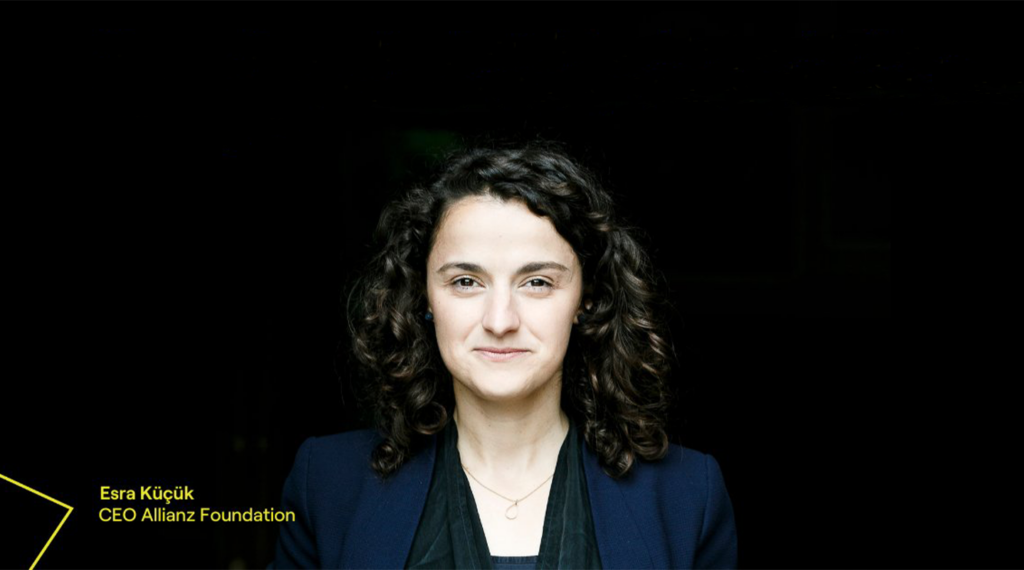Time for risktakers: The new Allianz Foundation gets to work

The Allianz Umweltstiftung and the Allianz Kulturstiftung will now be one. The two renowned foundations are joining forces in order to fulfil their mission even better: sustainably improving living conditions for present and future generations. We asked Esra Kücük, CEO of the new foundation, about the reasons for the integration and the strategic approach.
Why are the Allianz Umweltstiftung and Allianz Kulturstiftung joining forces?
EK: The Allianz Foundation builds upon the long-standing legacy of the former Allianz Umweltstiftung and Allianz Kulturstiftung. However, social and ecological circumstances have changed profoundly since the two foundations were established in 1989 and 2000. They were originally founded with the aim of promoting social cohesion in Europe through art and culture, and of conserving an environment worth living in ‒ goals that we will continue to pursue. But we need a fresh start to respond to the challenges of our time.
Growing nationalism, widening social divisions and the accelerating climate crisis have become the most pressing issues of our day. And these challenges are intrinsically intertwined. The climate crisis, for example, is also a social, political and cultural crisis. It leads to more poverty, greater marginalisation, increased migration. Climate change is a test for open societies. We already see how populists are trying to instrumentalise protest movements triggered by rising energy prices. This puts the transition towards a climate-neutral society at risk. In order to react to these and similar challenges, a common, system-oriented approach is needed that opens up future perspectives for people, society and the planet.
How does the new foundation aim to drive systemic change?
The Allianz Foundation is positioned at the interface of present challenges. We work with marginalised people or groups and advocate for equal opportunities. We promote resilient and diverse societies. And we are committed to fighting climate change and preserving biodiversity. Our work is built on the firm belief that open societies, social justice and a liveable environment go hand in hand.
In order to achieve our mission, we are working with our partners towards solutions that challenge conventional paradigms. “Business as usual” is no longer an option. This is also the reason why we no longer only have project funding, but also structural funding for non-profit organisations in our portfolio. We aim for transformational change. We do this by combining cultural and artistic approaches, civic engagement and climate action in a holistic way.
On the occasion of our foundation launch, we just published our Climate Cultures Call. It’s based on the premise that we need profound cultural change to win the battle against the climate crisis. If we want to protect our planet and enable a future worth living for everyone ‒ people, societies, but also natural biosystems ‒ then we must discuss a fundamental transformation of our cultural practices and our well-established models of thought. We will support ten projects that have this at the heart of what they do.
The Allianz Foundation also addresses the fact that the challenges of our times do not stop at national borders. This is why we are further internationalising our programmes. We will work with a pan-European network of partners and funding projects. Europe is our home and the centre of our activities. However, in order to live up to our values, we acknowledge that our responsibilities go beyond the EU boundaries. We will collaborate with individuals and organisations outside Europe, particularly in countries with politically and socially fragile environments in the Mediterranean.
What makes philanthropic organisations fit to tackle the challenges of our times?
In our Allianz Foundation Risktaker Pulse survey, we recently asked almost 60 leaders of social movements across five European countries about the greatest risks for a future worth living in.
Preliminary results show: Civil society plays an increasingly important role in compensating for deficits in state action through fast, flexible and unbureaucratic action. The war in Ukraine has highlighted this. Grass-roots movements and non-state actors can help precisely where state action falls short: for example, by supporting women who are exposed to sexual violence or by helping people of non-European origin who have fled Ukraine and often do not experience the same willingness to help as people with a Ukrainian passport.
This is where philanthropic engagement comes in. Philanthropic organisations can often react quicker and with a more long-term view than other public or private-sector actors. They can support unusual players in a non-bureaucratic way. And they can bring actors together that otherwise would not have met. This is becoming increasingly important in times where people tend to meet and communicate in bubbles. Philanthropy has the power to create spaces, build bridges and strengthen Europe’s civil societies in their pluralism and unity.
A larger Allianz Foundation study will be run on the concerns and expectations of young Europeans in Germany, Greece, Italy, Poland and the UK, and will be published next year. Stay informed via our newsletter on www.allianzfoundation.org
Authors

